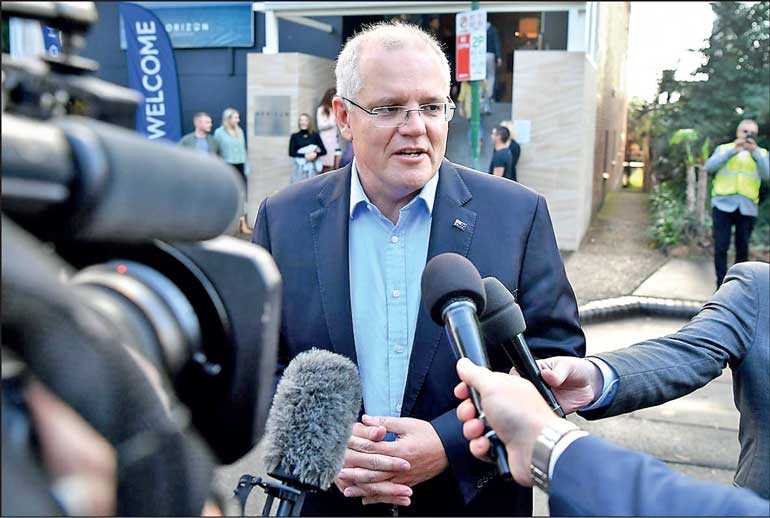Monday Feb 23, 2026
Monday Feb 23, 2026
Wednesday, 22 May 2019 00:00 - - {{hitsCtrl.values.hits}}

SYDNEY (Reuters): Australia’s conservative coalition is scrambling to deliver on a major election campaign pledge only days after being re-elected, immediate tax breaks for tens of millions of voters which could bolster the country’s slowing economy.
Prime Minister Scott Morrison said parliament may be unable to be convened in time to pass the tax legislation, promised to take effect from July 1, due to continued counting and vote checking from Saturday’s election.
“We hope to convene the parliament again as soon as we can...That’s not looking likely until very late into the back end of June,” Morrison told Sky News Australia late on Monday.
Australia’s central bank said on Tuesday that tax relief was needed to boost to a weakening economy hit by a slowdown in household consumption. The bank is likely to cut interest rates in June to help fuel the economy.
Reserve Bank of Australia (RBA) Governor Philip Lowe said in a speech the main reason for a downward shift in economic momentum - growth braked to an annualised 0.8% in the December quarter – was a slowdown in household consumption.
“Stronger growth in income will help, but the more important factor is some tax relief,” said Lowe in calling on the new government to play its part in boosting household incomes.
Morrison’s Liberal National coalition made tax rebates to around 10 million middle- and low-income earners from July 1 worth up to A$1,080 ($746.28) per person at the heart of its re-election campaign.
While the conservative coalition easily retained power on Saturday, Morrison said counting and checking of all votes cast was unlikely to be finished in time for parliament to convene before the end of the Australian financial year, June 30.
Rebates were set to be issued once Australians lodged their tax returns for the financial year to the end of June.
As a result, Morrison said he was looking at alternatives to ensure Australians receive the rebates, aiding an economy that likely grew in the March quarter by less than 2% on an annual basis, the lowest growth since the global financial crisis.
The RBA in particular would have welcomed the fillip to consumer demand as it wrestles with whether to cut interest rates from already record lows.
The first-quarter growth numbers will be released on June 5, a day after the RBA holds its next policy meeting where a cut to interest rates is a live possibility. The RBA has left its benchmark rate at a record low 1.50% since August 2016.
If the tax breaks are delayed, maybe for months or even a full year, it would pile pressure on the government already facing criticism for possibly breaking an election promise.
Economists had estimated the tax breaks would inject about A$7.5 billion ($5.18 billion) into the economy over 2019/20, lessening the need for a reduction in interest rates.
While delivering the tax rebates is a headache for Morrison his legislative agenda is on course to be boosted by a bigger outright majority.
Morrison entered the election at the head of a minority government after a series of defections, but secured an outright majority win on Saturday.
The Australian Electoral Commission said on Tuesday that Morrison’s coalition was ahead in three seats where counting was too close to call. Should the coalition keep its lead, the coalition will control 78 seats.